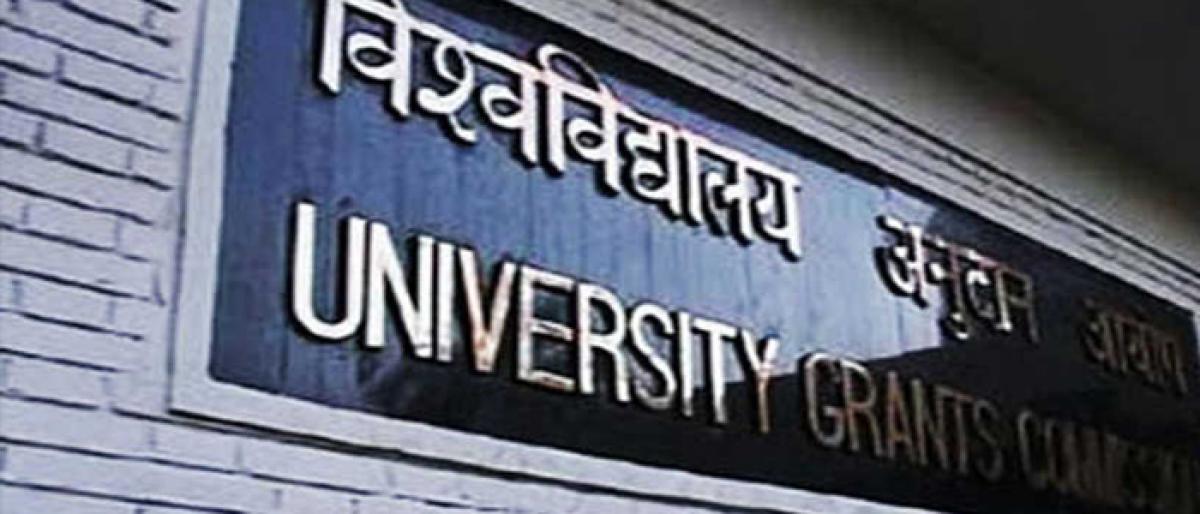Live
- Centre Revives Coffee Development Plan to Aid Farmers- Goyal
- Sensational Crime Incidents in Andhra Pradesh and Telangana: 2024 Year in Review
- Tragic Loss for Beejady Village: Lance Havaldar Anoop Poojary Among Five Soldiers Killed in Poonch Accident
- Mass Rally Organized by BJP in Hyderabad on Atal Bihari Vajpayee's Centenary Celebration
- J&K: With over 25,000 houses built under PMAY, Doda ranks second in Jammu region
- Celta Vigo extend all-time club top-scorer Iago Aspas’ contract till 2026
- BGT: Kaif gives preference to Jaiswal-Rahul opening pair for Boxing Day Test against Australia
- Odisha CM Majhi, Naveen Patnaik extend Christmas greetings
- Icebreaker Keyboard: AluminIum Design Costing as Much as a MacBook Pro
- ‘Rifle Club’ Movie Review: A Stylish Thriller That Falls Short in Storytelling
Just In

The Telangana State Council of Higher Education TSCHE and its counterpart, Andhra Pradesh State Council of Higher Education APSCHE in AP have to give in to every decision of apex bodies of higher education fearing that taking a different position might starve them of funds
Hyderabad: The Telangana State Council of Higher Education (TSCHE) and its counterpart, Andhra Pradesh State Council of Higher Education (APSCHE) in AP have to give in to every decision of apex bodies of higher education fearing that taking a different position might starve them of funds.
According to sources, in the TSCHE, the State Higher Education Councils (SHECs) and the State universities have been toeing the line of these apex bodies of higher education in almost all the issues. But, the situation has been more intense for the last four years and “both (SHECs and varsities) have to give their consent on dotted lines,” said a top official.
A slew of measures suggested by the University Grants Commission (UGC) and Ministry of Human Resources and Development (MHRD) for the last four years in the name of quality in higher education have been bringing higher education councils and state universities under immense pressure.
Latest in the series of measures is the introduction of entrance examination for research courses at university-level without any finality reached on the issue of allied subjects. Speaking to The Hans India, a top official from Osmania University said that the UGC/MHRD had sought the list of allied subjects. But, there was no finality reached so far on the issue. Unless the same is decided, conducting the entrance test for research courses would defeat the much-intended purpose of improving quality and standards in the research courses in the State universities, he said.
Further, very few of the State universities have a school, centre or department like Commerce and Management to enable the students to go for interdisciplinary research. Similar is the case with several other subjects, he pointed out.
Following the entrance norm, from now on, each department will have its own candidates passing the entrance examination to take up research. In addition, there is a restriction on the number of students a faculty member can guide. This literally dries off the chances of any faculty member coming forward to guide or act as a co-guide to supervise research students from other departments. However, taking a different position, another official from the Andhra University said the issue of allied subjects, inter and multi-disciplinary research, in-breeding have been figured several times in the discussions at the UGC/MHRD level. But, the situation is still in a fluid state.
Adding that UGC had indeed addressed them in one way or the other, he said, for example, a student who has completed a two years course in M.Com can be allowed to take admission in the second year of an allied subject. Similarly, the universities can enter into a MoUs with other universities within the State and the country. This allows a student from one higher education institutions to acquire credits in an allied subject or inter-discipline subjects offered in the other institutions.
In turn, this would help in mobility of students from one higher education institution to another across the country and improve their learning and research outcomes. But, the main hitch is that the State universities are facing logistic problems to do it. Further, the MHRD is mulling to ban appointments of those qualified in the research degrees in the same university as faculty members soon.
It was against this backdrop that without streamlining all these issues, conducting entrance for research and possible banning of appointments in the same university in the name of in-breeding would only help few higher education institutions like central universities, national universities and the like, he pointed out.

© 2024 Hyderabad Media House Limited/The Hans India. All rights reserved. Powered by hocalwire.com







